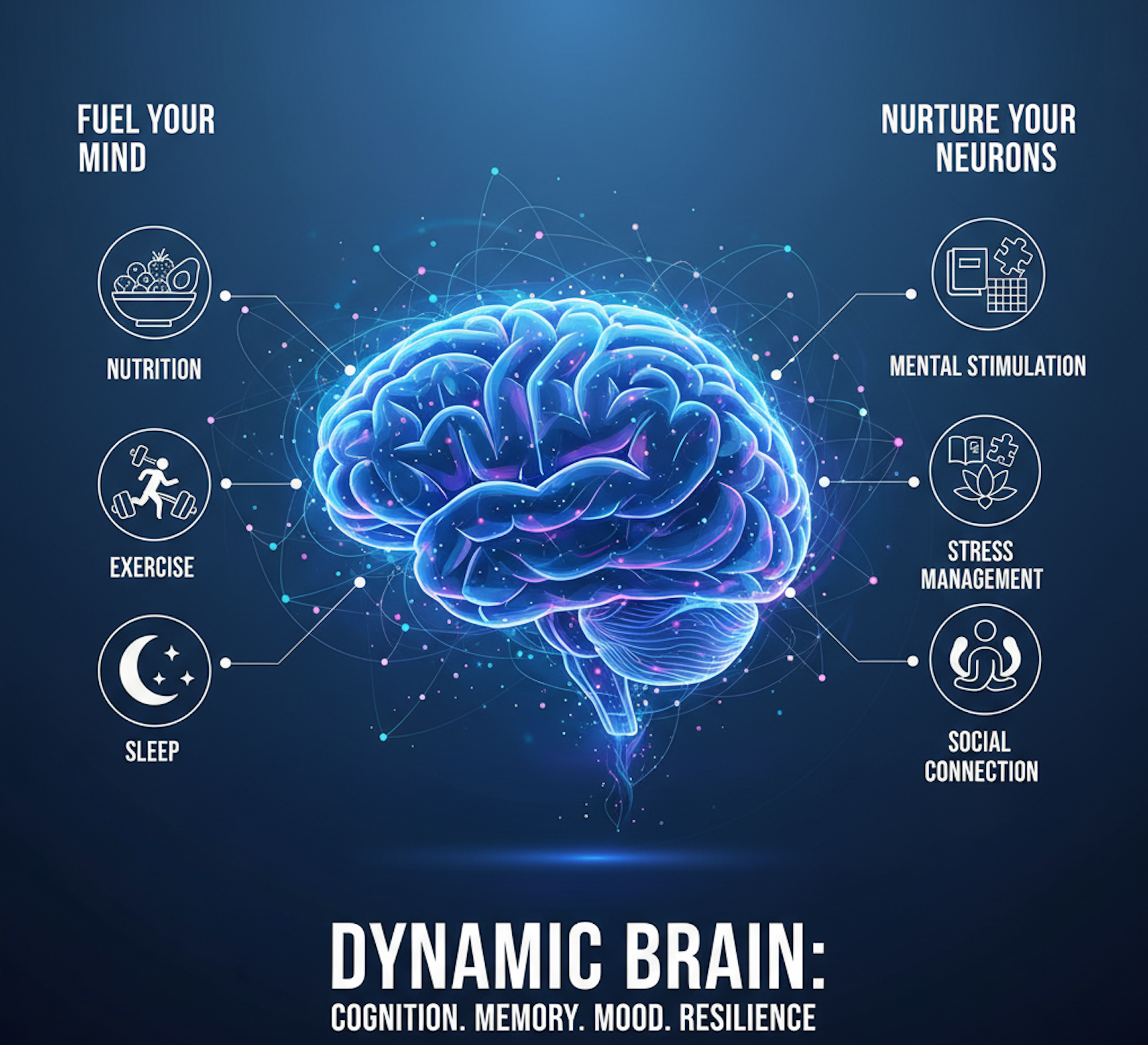

Your brain shapes how you think, feel, move, and remember. Protecting it isn’t only for later in life—it starts with the choices you make today. This guide explains what brain health really means, separates fact from fiction, and offers practical, science-backed habits you can use daily.
Brain health refers to your brain’s ability to function well across your lifespan. It allows you to learn, remember, reason, and recover from stress or injury. It depends on four key systems:
Neuroplasticity, the ability of the brain to form new connections (Wikipedia)
Metabolic support, including oxygen, nutrients, and blood flow
Network balance, how different brain regions coordinate
Resilience, protection against inflammation and damage
Brain health isn’t static. It changes with your habits, environment, and health.
Learn more from Cleveland Clinic’s Brain Health Guide and Alzheimer’s Research UK.
You can strengthen your brain at any age by focusing on a few proven lifestyle habits:
Sleep and recovery
During sleep, the brain clears waste through the glymphatic system and consolidates memories. Chronic sleep loss impairs concentration and increases dementia risk (Mayo Clinic).
Physical activity
Regular movement increases blood flow, improves mood, and supports the growth of new brain cells. Even walking or dancing can help (Cleveland Clinic).
Nutrition
Diets rich in omega-3s, leafy greens, and antioxidants support cognitive health. The MIND diet and Mediterranean diet are both linked to lower Alzheimer’s risk.
Mental stimulation
Challenging your brain through reading, puzzles, or learning a new skill enhances cognitive reserve. Variety and novelty matter.
Social engagement
Isolation can increase cognitive decline risk. Social interaction, empathy, and community involvement boost emotional and brain health (National Institute on Aging).
Managing health conditions
Keep your blood pressure, blood sugar, and cholesterol under control. Vascular and metabolic diseases are closely linked to brain aging.
Protective habits
Limit alcohol, quit smoking, and wear helmets when cycling or skiing. Small precautions prevent long-term harm.
If you want to build these habits into your daily life, try the Fawkes Patient Support Tool. It creates personalized brain-health routines, reminders, and evidence-based insights.
Many ideas about the brain are popular but wrong. Here’s what science actually shows:
Fact: Brain imaging reveals activity throughout almost every region, even at rest. The “10 percent” idea is a myth (Medical News Today, Dana Foundation).
Fact: While some functions (like language) lean to one side, most cognitive processes involve both hemispheres working together (Centre for Brain Health).
Fact: Thanks to neuroplasticity, the brain can rewire itself and recover function after injury, especially with rehabilitation (Wikipedia).
Fact: Intelligence depends on how efficiently brain networks communicate—not on size (Penn Neuro Know).
Fact: Few “brain boosters” have proven benefits. Most results come from healthy habits, not pills (National Institute on Aging).
Fact: Some decline is normal, but not all. Healthy lifestyle choices significantly reduce cognitive decline (UT Physicians).
Fact: The brain can’t truly multitask; it rapidly switches between tasks, leading to fatigue and mistakes.
You can’t control everything, but you can build habits that make a measurable difference.
Morning: Light exercise and a protein-rich breakfast
Daytime: Tackle a learning challenge or mentally engaging task
Evening: Socialize, relax, and limit screens before bed
Night: Keep a consistent sleep schedule in a cool, dark room
If you want personalized tracking and health data aggregation to support your cognitive goals, sign up for Fawkes Biodata. It helps you own, unify, and use your medical data to improve your health and participate in clinical research.
Takeaway:
Brain health is not about magic solutions or supplements. It’s built on simple, consistent habits: sleep, movement, nutrition, learning, and connection. When you protect your brain, you protect every part of your life.